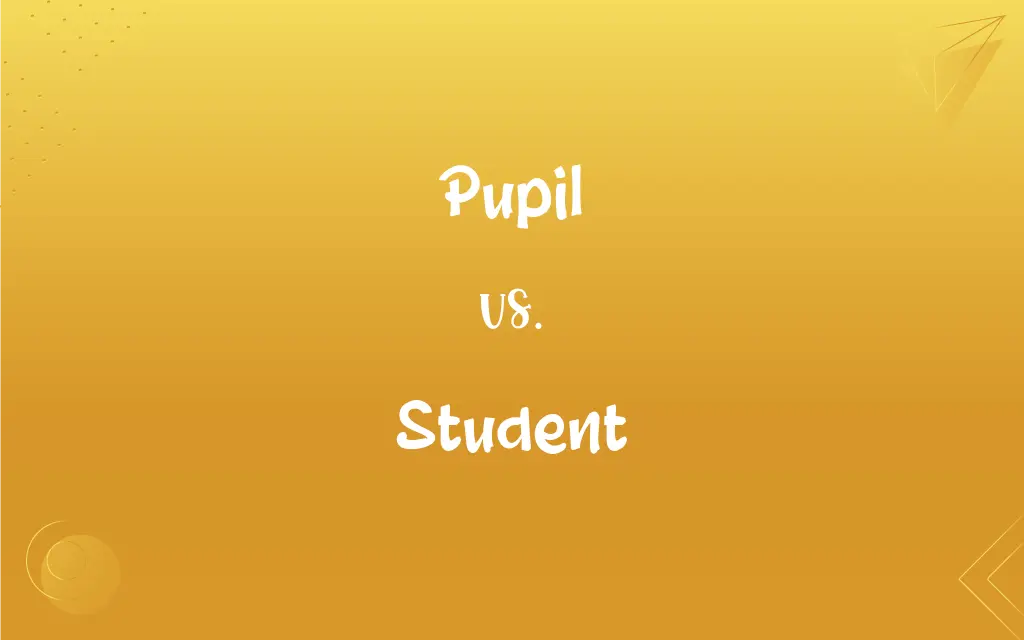Pupil vs. Student: What's the Difference?
Edited by Harlon Moss || By Janet White || Published on November 22, 2023
A pupil is a young learner, especially in primary or secondary education, while a student refers to anyone engaged in learning, often at higher education levels.

Key Differences
"Pupil" typically refers to a young learner, often in a primary or secondary school setting. "Student," on the other hand, is a more general term that can apply to learners of any age, often used for those in colleges or universities.
The term "pupil" often implies a more direct and personal relationship with the teacher, suggesting a more guided form of learning. In contrast, "student" implies a degree of independence and self-directed study, particularly at the university level.
"Pupil" is more commonly used in British English, particularly in the context of younger learners in formal education. "Student" is universally used across English dialects and can refer to anyone engaged in study, regardless of the education level or age.
In legal and official contexts, "pupil" might refer to someone under the care and supervision of a school. "Student" encompasses a broader range of educational situations, including adult education and professional development courses.
While both "pupil" and "student" denote individuals engaged in learning, the nuances in their use reflect differences in age, level of independence, and sometimes the type of educational institution.
ADVERTISEMENT
Comparison Chart
Typical Age Group
Young learners (primary, secondary school)
Learners of any age (often higher education)
Relationship with Teacher
Direct, more dependent
Independent, self-directed
Usage in English
More common in British English
Universal across English dialects
Educational Level
Primary and secondary education
All levels, including college and adult education
Implication
Guided learning, under supervision
Independent learning, broader range of studies
ADVERTISEMENT
Pupil and Student Definitions
Pupil
A young learner in primary or secondary school.
The pupil excelled in mathematics at her primary school.
Student
A person enrolled in courses at a university or college.
The student council organized a charity event on campus.
Pupil
A learner in a dependent educational relationship.
The teacher was proud of her pupil's progress.
Student
A learner in any educational setting, including adult education.
He became a student again to pursue a degree in history.
Pupil
Someone under the direct guidance of a teacher.
Each pupil in the art class had a unique style.
Student
An individual engaged in learning, especially at higher education levels.
The student completed her thesis on environmental science.
Pupil
A minor student under school supervision.
The school ensured the safety of every pupil during the trip.
Student
Someone who studies a particular subject or field.
As a medical student, she spent hours in the lab.
Pupil
A term for students in formal education systems.
The science fair was open to all pupils in the district.
Student
An individual who pursues academic or professional education.
The engineering student presented his innovative design.
Pupil
A student under the direct supervision of a teacher or professor.
Student
One who is enrolled or attends classes at a school, college, or university.
Pupil
(Law) A minor under the supervision of a guardian.
FAQs
What is a pupil?
A young learner, typically in primary or secondary education.
Can 'student' refer to primary school learners?
Yes, but 'pupil' is more specific to this age group.
Is there an age limit for being a pupil?
Generally, it refers to minors in school.
Can adults be called students?
Yes, especially in higher education or adult learning contexts.
What's the difference in teacher relationships between a pupil and student?
Pupils often have a more guided relationship, while students are more independent.
Is 'pupil' a formal term?
Yes, often used in formal and legal educational contexts.
Who is considered a student?
Anyone engaged in learning, at any educational level.
Can a pupil also be a student?
Yes, as both terms relate to being a learner.
Is 'student' appropriate for vocational training?
Yes, it's suitable for any form of education.
Is 'pupil' used for university learners?
Rarely, it's more appropriate for younger learners.
Are high school attendees students or pupils?
They can be called either, but 'student' is more common in the US.
Which term is more common in the UK for young learners?
'Pupil' is more commonly used in the UK.
Are university postgraduates called pupils?
They are usually referred to as students.
Is there a cultural difference in the use of 'pupil' and 'student'?
Yes, 'pupil' is more common in British English, while 'student' is universally used.
Are college attendees called pupils?
Typically, they are referred to as students.
Is a kindergarten attendee a pupil or student?
More commonly referred to as a pupil.
Does 'pupil' imply a certain level of dependence?
Yes, it suggests a more dependent learning relationship.
Can 'student' be used universally across all education levels?
Yes, it's a universal term for learners.
Can 'student' refer to someone studying online?
Yes, it encompasses all forms of learning.
What term is used for learners in professional development?
'Student' is commonly used.
About Author
Written by
Janet WhiteJanet White has been an esteemed writer and blogger for Difference Wiki. Holding a Master's degree in Science and Medical Journalism from the prestigious Boston University, she has consistently demonstrated her expertise and passion for her field. When she's not immersed in her work, Janet relishes her time exercising, delving into a good book, and cherishing moments with friends and family.
Edited by
Harlon MossHarlon is a seasoned quality moderator and accomplished content writer for Difference Wiki. An alumnus of the prestigious University of California, he earned his degree in Computer Science. Leveraging his academic background, Harlon brings a meticulous and informed perspective to his work, ensuring content accuracy and excellence.






































































